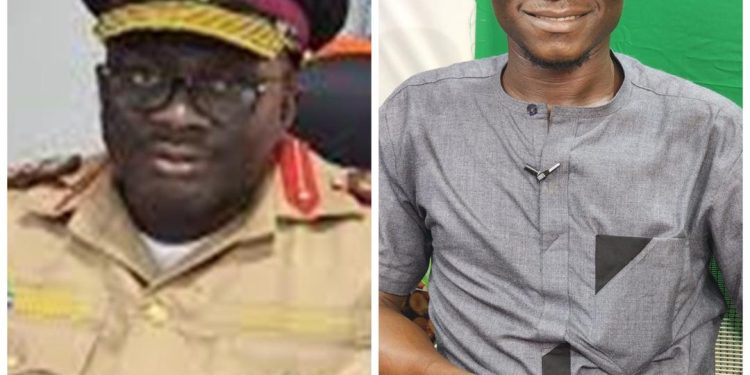In a troubling escalation of events, the Executive Director of the Sierra Leone Road Safety Authority (SLRSA), Rev. Smart K. Senesie, has demonstrated a dangerous contempt for press freedom by orchestrating an attack on the Managing Editor of Salone Compass Newspaper, Ibrahim Alusine Kamara, through an arrest order at the Criminal Investigation Department (CID) for alleged “cyberbullying.” This move comes in the wake of a scathing but well-founded Salone Compass report, exposing rampant corruption at the SLRSA’s Moyamba Station.
Senesie’s actions are not only a blatant assault on press freedom but a desperate attempt to suppress legitimate investigations into widespread fraud under his watch. The October 2014 Salone Compass article, headlined “Massive Corruption Uncovered at SLRSA Moyamba Station,” was a thorough exposé that highlighted fraudulent activities at SLRSA stations, including Moyamba, Pujehun, and others. The newspaper’s findings were not only credible but confirmed by Senesie himself, as he begrudgingly acknowledged the involvement of system operators in the corruption scandal.
In a poorly written social media dispatch, allegedly authored by Umaru Kanu and heavily promoted by Senesie’s allies, the Salone Compass report was clumsily labeled “misinformation.” This futile attempt to dismiss the story reeks of desperation, as it became clear that the article struck a nerve. Rather than refuting the corruption claims with evidence, the SLRSA boss resorted to character assassination and defamation of journalists, a tactic unbecoming of any leader, let alone one claiming to uphold integrity.
The lengths to which Senesie has gone to stifle dissent are alarming. When Salone Compass followed up on their investigation by questioning him about additional fraudulent activities, such as the illegal transfer of staff to non-existent departments, the response was not one of transparency or accountability. Instead, Senesie reportedly ordered the harassment of the publication and its editors, using state security apparatus to intimidate them. This shows a deeply authoritarian streak, where a state official uses his position to bulldoze any form of criticism that questions his leadership.
What’s more concerning is the selective manner in which corruption cases are handled under Senesie’s administration. While certain individuals were reported to the Anti-Corruption Commission (ACC) in the past, others, such as the system operators involved in the license fraud, were merely subjected to internal investigations—raising suspicions of selective justice and micromanagement. This hypocrisy undermines his hollow declarations of fighting corruption and speaks volumes about the nature of leadership at the SLRSA.
This is not the first time Rev. Senesie has misled the public and even manipulated government figures. His infamous attempt to convince President Julius Maada Bio to boast about digitized services at the SLRSA, services that were either incomplete or nonfunctional, is a glaring example. Such dishonesty not only risks tarnishing the image of the president but also deepens public mistrust in state institutions. The lofty claims of RFID vehicle licenses, biometric drivers’ licenses, and electronic connectivity were mere smoke and mirrors at a time when basic services such as drivers’ licenses were not even available.
The recent revelation that the SLRSA is facing financial quagmire—despite having 13 revenue streams—further indicates gross mismanagement under Senesie’s tenure. Workers’ salaries are reportedly delayed, and the institution’s ability to meet its financial obligations is in shambles. Yet, instead of focusing on fixing these systemic failures, the Executive Director has chosen to launch personal attacks on journalists and silence those who dare to hold him accountable.
The arrest of Ibrahim Alusine Kamara on baseless charges of cyberbullying is a cowardly move meant to intimidate the press and prevent further exposure of corruption. It is a clear violation of press freedom, a cornerstone of any functioning democracy. In a country where transparency and accountability are already fragile, such authoritarian actions set a dangerous precedent, where state officials can abuse their power without consequence.
We call on the public and the international community to stand firm in defense of press freedom and against the corruption plaguing public institutions like the SLRSA. The reckless actions of Rev. Senesie must be condemned in the strongest terms. Journalists like Kamara are not criminals; they are watchdogs of society who risk their safety to expose the truth. An attack on them is an attack on democracy itself.
The SLRSA is a public institution funded by taxpayers, not a personal fiefdom for Senesie to manage at his whim. His aggressive stance against the media only serves to confirm suspicions of deep-seated corruption and mismanagement within the authority. The public deserves better, and it is high time that authorities, both within Sierra Leone and globally, hold Rev. Senesie accountable for his actions.
Silencing the press will not hide the truth—Salone Compass has already exposed the rot within SLRSA, and no amount of intimidation will erase the facts. The people of Sierra Leone must demand transparency, accountability, and justice. Anything less is a betrayal of the public trust.













